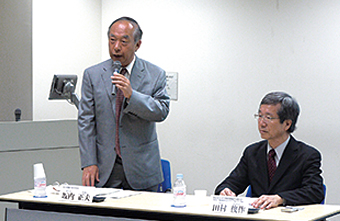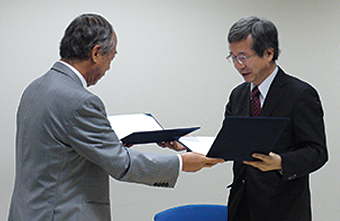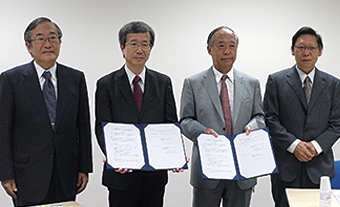
Makoto Yonezawa
(Director, Scholarly and Academic Information Division, NII)
● Introduction


Dr. Masao Sakauchi, Director General, NII (left) and Prof. Shunsaku Tamura, Chair, Japanese Coordinating Committee for University Libraries and Director, Keio University Media Center (right) at the signing ceremony
On October 13, 2010, Japan’s national, public, and private university libraries and the National Institute of Informatics (NII) signed an agreement to strengthen their existing e-journal consortium alliance and launch a new organization. Under the accord, they will move toward forming one of the world’s largest e-journal consortia, with nearly 500 member libraries, and will consolidate a system that can ensure the stable and continuous acquisition and provision of the electronic journals that Japanese universities require for their research activities.
In addition to the measures for e-journals, the accord marks a comprehensive agreement encompassing such areas as promotion of institutional repositories, strengthening of union catalog databases, and personnel exchange and training. It is expected to serve as the foundation for multipronged liaison and cooperation between university libraries and NII in the future.
● The Background to the Need for a
New Consortium Alliance
1. The Importance of Electronic Journals
Today, the publication of scholarly information, especially research results in article form, is migrating to the medium of online journals. In particular, the overseas journals in which the latest advances are announced have shifted from the conventional print format to electronic versions to such a degree that scientific research in Japan could not exist without e-journals.
According to the Ministry of Education, Culture, Sports, Science and Technology, the number of e-journals accessible in university libraries rose from about 1.23 million titles in FY 2004 to about 2.47 million titles in FY 2008, an increase of some 1.24 million titles (100.8 percent).
2. The Problem of E-journal Prices
Over the same period, total e-journal-related expenditure rose from around 6.2 to 18.5 billion yen, an increase of 12.3 billion yen or 198.4 percent, and this escalation continues. A major factor driving up costs, apart from the growing number of available titles, is constant price rises due to the monopoly that large overseas commercial publishing houses hold in the journal market. At the same time, Japan’s university libraries are facing budgetary constraints and other difficult conditions, and they have reached their limit in coping with the spiraling costs of library resources, including e-journals.
3. The Past Efforts of Consortia
In response to the e-journal price spiral, consortia were formed by the national universities (JANUL) in 2000, and the local public universities and private universities (PULC) in 2003. These two bodies have managed to contain prices to a certain extent by negotiating with the major overseas publishers, and it has now been decided to try forming a closer alliance in order to build further negotiating strength.
● The New Consortium Alliance

From left, Prof. Motoo Furuta (President, JANUL; Director, University of Tokyo Library System), Prof. Tamura, Dr. Sakauchi, and Prof. Shintaro Nakanishi (Director, Yokohama City University Library and Information Center)
The new alliance aims to consolidate a system that can ensure the stable, continuous acquisition and provision of electronic journals. With that objective, it will improve the educational and research environment in Japan by carrying on the following activities:
(1)
|
unified negotiations for subscriptions to e-journals and
related materials |
| (2) |
study of new subscription models for e-journals |
| (3) |
strengthening of backfile archives |
| (4) |
introduction of new electronic resources |
(5)
|
support for access to e-journals
(improving the user authentication environment) |
| (6) |
advocacy about e-journals |
To underpin the above activities, it was decided to establish the new consortium’s secretariat within NII. The latter has therefore set up a preparatory office for the consortium alliance and has begun preparations to launch the new organization.
● The Comprehensive Agreement as a Basis for the Consortium Alliance
The newly signed agreement will serve as the foundation for the e-journal consortium alliance. The university libraries and NII already have a history of working together in other areas, in such programs as the creation of Japan’s largest library union catalog, the creation of the world’s second largest number of institutional repositories (by country), and training sessions for a total of 25,000 library personnel.
| (1) |
consolidating a system for the acquisition of and guaranteed permanent access to e-journals and related materials, including backfiles |
| (2) |
creating a system for the dissemination of knowledge by universities via institutional repositories |
| (3) |
strengthening union catalog databases, including the cataloging of electronic information resources |
| (4) |
personnel exchanges and training in the acquisition and dissemination of scholarly information |
| (5) |
promoting international cooperation in the acquisition and dissemination of scholarly information
|
With this agreement as a starting point, we can expect to see the university libraries and NII pursue various ventures that will usher in a new stage in scholarly communication in Japan. |

